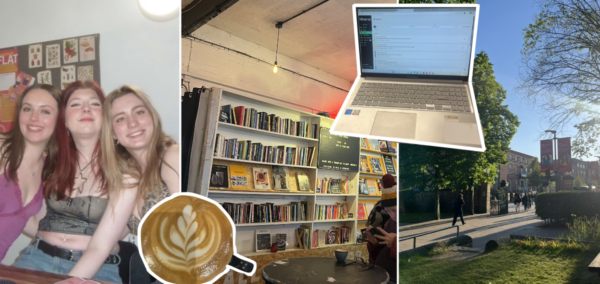
Mental Health Awareness Week: How to take care of yourself as a student in London
Your mental health is just as important to take care of as your physical
Being a student is an especially emotionally demanding period of life. Not just because of the turbulence of exam season (though this is valid), but because often we’re at our most vulnerable – living away from home, in greater, bigger environments, surrounded by new people constantly and being stretched out of our comfort zones.
In recognition of Mental Health Awareness week beginning next Monday, I wanted to write about and credit the significance of looking after your mental health. I, admittedly, have been plagued with anxiety and depression my whole life. And as much as I love living in London, being a student at King’s and everything that comes with it – there are times where it has all got a little bit too much and I have struggled.
It’s perfectly okay to feel any form of emotional vulnerability that reaches a point where it starts to inhibit the way in which we live our lives. Often, we cannot control when these moments happen, it’s random. And yes, we might not be able to stop it, and almost always can’t, but we can make steps towards how we can feel afterwards, so next time we feel in any particular way emotionally vulnerable, the impact on the way in which we see ourselves and our lives aren’t as difficult.
There’s no faultless or right way to look after your mental health. However, over the years I have learnt what works for me, in order to find some kind of happiness within myself and cope with my sometimes, self-destructive patterns and feelings. If these could help anyone at all, I feel it would be best to share, and if not, I’d like to contribute to normalising discussing mental health by talking about my own. There is no stigma nor shame.
Most Read
What is the worst that could happen?
Growing up my dad has always told me this during all of my moments of anxiety. And until my adult life, I don’t think I’ve ever truly appreciated it. I think I thought when I was younger, it halfway instilled more fear in me, but also made me feel like I was overestimating the way I felt. Now, this question is not one to challenge one’s own thoughts or invalidate them in anyway, but for me, this works as a method of self-reflection.
The world is much bigger than I know, and yes, bad things happen often, but the world often works itself out, and I wouldn’t be the person who I am today without all of the awful moments in life, but neither would anyone else – it shapes us. I suppose it’s a way to prepare yourself for certain outcomes – but especially in moments of anxiety, the worst thing that could happen was I would have a panic attack, and then it would be over. Likely, I’d have one again within the next week, and when it happens, its horrible – but I’m alive and I can only do so much to stretch myself. Sometimes our own mind and body rejects us, and that’s okay.
Talk about the way you’re feeling
I’m not going to say “a problem shared is a problem halved”, because we’ve all heard it before and it’s wildly unhelpful. Sometimes we don’t want to talk about how we feel, because in many times, we don’t really know – the world is overwhelming us and it’s making us feel a way that’s inexplicable to anyone but you. Although, sharing how you feel, in as many or as few words you can to someone you love and trust can be a weight lifted. This is another thing I never used to do and I think I would have saved so many tears if I did it sooner, because I wouldn’t have got the help and support I needed either.
It’s hard sometimes to look at those around you and think, who is going to understand? But what I’ve come to realise is, we’re all on a spectrum – we all have our own anxieties and troubles that impact our lives. This affects some of us more than others – but this does mean there is always going to be one person you know who will be empathetic of the way you feel.
No two people are the same nor do they feel the same, but we are all humans who deserve to be listened to and be happy, whatever it takes. Even if you aren’t quite ready to talk to others, I think talking to yourself through journaling and other forms is a good strategy.

Develop a distraction
Your mental health is just as important as your physical health, if not more. Often when I’m down, I don’t want to go for a walk or a run – I want to stay in bed all day and binge watch Gilmore Girls. And some days, you do need to do that – take a mental health day. However, this is not a firmly permanent or effective coping mechanism.
I think, first, think about how you feel – maybe communicate it or write it down. And then, turn your mind to something else – this doesn’t need to be something mentally consuming, just something that will stir your thoughts in an alternative direction. A coping mechanism of mine is reading – immersing myself into others fictional thoughts rather than my own. Is this a little bit delusional? Maybe, but it works.

However, the main distraction I choose to embrace is connecting with myself through other people and other things. This might be through looking at old family photo albums, and being nostalgic about beautiful moments from years ago. I will teach my dog a new trick (he still can’t roll over though). Or, I could even develop a newfound love for knitting like an old lady, so learning a new skill.
Even in my darkest moments, it has been hard to distract myself from the way I feel, but no one should be consumed by any bad thoughts. Trying to turn your mind to something else that truly brings you some kind of hope and happiness is worth holding onto and putting into practice.
Be kind to yourself
Please give yourself gratitude and space to heal. No one is happy all the time, and no one is ok all the time. We all have something, whatever that may be, that stops us from living the way we should. When you’re at University, almost nothing is certain – you don’t know if you’re going to get that internship, pass your exam, or if you’re going to crumble in front of everyone doing your presentation. Maintain who you are on the inside and out, to the best way you can. Be authentic – talk about how you feel and encourage yourself to listen to your mind.
Self-love is the greatest virtue.
You can find help and resources for your mental health through King’s here or through crisis support here.
If you or someone you know has been affected by this story, please speak to someone or contact Samaritans on 116 123 at any time. You can also contact Anxiety UK on 03444 775 774, Mind on 0300 123 3393, Calm (Campaign against living miserably) on 0800 58 58 58, and Student Minds online here. You matter.
















